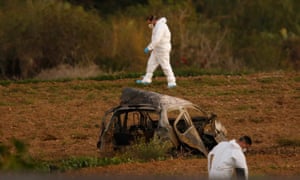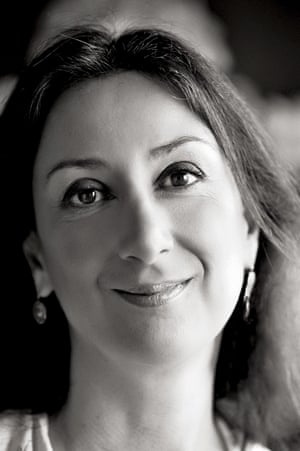Daphne Caruana Galizia, a blogger whose investigations focused on corruption, was described as a ‘one-woman WikiLeaks’
 Forensic experts walk in a field after a powerful bomb blew up a car killing investigative journalist Daphne Caruana Galizia. Photograph: Darrin Zammit Lupi/Reuters
Forensic experts walk in a field after a powerful bomb blew up a car killing investigative journalist Daphne Caruana Galizia. Photograph: Darrin Zammit Lupi/Reuters
The journalist who led the Panama Papers investigation into corruption in Malta was killed on Monday in a car bomb near her home.
Daphne Caruana Galizia died on Monday afternoon when her car, a Peugeot 108, was destroyed by a powerful explosive device which blew the car into several pieces and threw the debris into a nearby field.
A blogger whose posts often attracted more readers than the combined circulation of the country’s newspapers, Galizia was recently described by the Politico website as a “one-woman WikiLeaks”. Her blogs were a thorn in the side of both the establishment and underworld figures that hold sway in Europe’s smallest member state.
Her most recent revelations pointed the finger at Malta’s prime minister, Joseph Muscat, and two of his closest aides, connecting offshore companies linked to the three men with the sale of Maltese passports and payments from the government of Azerbaijan.
No group or individual has come forward to claim responsibility for the attack.
Malta’s president, Marie-Louise Coleiro Preca, called for calm. “In these moments, when the country is shocked by such a vicious attack, I call on everyone to measure their words, to not pass judgment and to show solidarity,” she said.
FacebookTwitterPinterest Daphne Caruana Galizia, who claimed to have no political affiliations, set her sights on a wide range of targets, from banks facilitating money laundering to links between Malta’s online gaming industry and the Mafia. Photograph: AP
After a fraught general election this summer, political commentators had been fearing a return to the political violence that scarred Malta during the 1980s.
In a statement, Muscat condemned the “barbaric attack”, saying he had asked police to reach out to other countries’ security services for help identifying the perpetrators.
“Everyone knows Ms Caruana Galizia was a harsh critic of mine,” Muscat at a hastily convened press conference, “both politically and personally, but nobody can justify this barbaric act in any way”.
The Nationalist party leader, Adrian Delia – himself the subject of negative stories by Galizia – claimed the killing was linked to her reporting. “A political murder took place today,” Delia said in a statement. “What happened today is not an ordinary killing. It is a consequence of the total collapse of the rule of law which has been going on for the past four years.”
According to local media reports, Galizia filed a police report 15 days ago to say that she had been receiving death threats.
The journalist posted her final blog on her Running Commentary website at 2:35pm on Monday, and the explosion, which occurred near her home, was reported to police just after 3pm. Officers said her body had not yet been identified. According to sources, one of her sons heard the blast from their home and rushed out to the scene.
Galizia, who claimed to have no political affiliations, set her sights on a wide range of targets, from banks facilitating money laundering to links between Malta’s online gaming industry and the Mafia.
What are the Panama Papers? A guide to history's biggest data leak
What is Mossack Fonseca, how big is it, and who uses offshore firms? Key questions about one of the biggest ever data leaks
Read more
Over the last two years, her reporting had largely focused on revelations from the Panama Papers, a cache of 11.5m documents leaked from the internal database of the world’s fourth largest offshore law firm, Mossack Fonseca.
The data was obtained by the German newspaper Süddeutsche Zeitung and shared with media partners around the world, including the Guardian, by the International Consortium of Investigative Journalists (ICIJ) in Washington.
Galizia’s son, Matthew Caruana Galizia, is a journalist and programmer who works for the ICIJ.
Earlier this year, during Malta’s presidency of the European Union, her revelations caused major concern in Brussels.
MEPs openly called for Muscat’s departure amid a growing scandal involving his wife, a Panamanian shell company and alleged payments from the president of Azerbaijan’s daughter.
Muscat, who has been premier since 2013, went to the polls a year early after his wife was implicated in the scandal. He has always denied any wrongdoing and promised to quit if any evidence emerges of his family having secret offshore bank accounts used to stash kickbacks – as Caruana Galizia had alleged.
Responding to news of the attack, the German MEP Sven Giegold, a leading figure in the parliament’s Panama Papers inquiry, said he was “shocked and saddened”.
“It is too early to know the cause of the explosion but we expect to see a thorough investigation,” said Giegold. “Such incidents bring to mind Putin’s Russia, not the European Union. There can be absolutely no tolerance for violence against the press and violations of the freedom of expression in the European Union.”
Opposition politicians claim there has been a collapse in the rule of law in Malta since Muscat returned Malta’s Labour party to power in 2013 following a long period in opposition. Four police commissioners have resigned under his leadership. The fifth, Lawrence Cutajar, took up his post in August 2016.
There have been several car bomb killings in Malta during recent years. While the perpetrators have not been identified, the violence is thought to have been linked to disputes between criminal gangs. None are thought to have been politically motivated.
Galizia was 53 and leaves a husband and three sons.





No comments:
Post a Comment